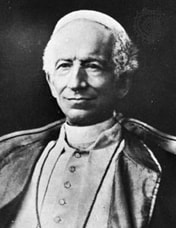
Editor's Note: The following is a modified abstract of a paper presented at a conference held by Christ the King Law Center (CKLC) on October 8, 2016 titled Make America Catholic Again! Portions of this abstract were also taken from traditional Catholic attorney and author Christopher Ferrara's book The Church and the Libertarian: A Defense of the Catholic Church's Teaching on Man, Economy, and State.
The Catholic Church teaches that employers must pay just wages to their workers. The Church's doctrine on the just wage and the natural rights of laborers in general is developed in the seminal encyclical of Leo XIII, Rerum Novarum (1891). In this encyclical Leo explains that, because of the Fall of Adam, labor is necessary for man's very survival. Thus, labor is not merely a personal activity in which one can engage or not engage at one's pleasure, but rather the very means by which life is sustained. From this truth of Revelation, says Leo, one must conclude that while free agreements concerning the price of labor are certainly permissible, such agreements, as a matter of natural justice, must provide for the laborer's support and that of his family:
- Let the working man and the employer make free agreements, and in particular let them agree freely as to the wages; nevertheless, there underlies a dictate of natural justice more imperious and ancient than any bargain between man and man, namely that wages ought not to be insufficient to support a frugal and well-behaved wage-earner. If through necessity or fear of a worse evil the workman accept harder conditions because an employer or contractor will afford him no better, he is made the victim of force and injustice... If a workman's wages be sufficient to enable him comfortably to support himself, his wife, and his children, he will find it easy, if he be a sensible man, to practice thrift, and he will not fail, by cutting down expenses, to put by some little savings and thus secure a modest source of income. Nature itself would urge him to this. [1]
The employer's duty to pay his workers a wage sufficient for the support of families-when this is possible, of course[2]-arises from the family's status as the building block of the State," a true society, and one older than the State," which "has rights and duties peculiar to itself which are quite independent of the State." [3]
Therefore in a Catholic social order all employers would strive to pay a living wage to their employees whenever and wherever possible, secured by collective bargaining and arbitration if need be.
Private bodies-such as a modern analogue of the guilds or other forms of workers' association-would oversee such matters as labor disputes and workplace safety, disability and unemployment insurance funds, and measures designed to allow married women with children to remain in the home while their husbands work. As a last resort, local government would be asked to intervene for purposes of dispute resolution.
In terms of employee compensation, local or state law would fix a minimum wage if the competent authority, either the electorate or local legislature, is persuaded of its efficacy, and local law would encourage the creation of pension and wage funds in lieu of corporate taxes. Local or state law would also ban child labor under appropriate legal criteria. Local or state boards would intervene to arbitrate labor issues only at the request of private labor bodies or management in the event of an impasse.
[1] Rerum Novarum, n. 45.
[2] Obviously, employees cannot justly demand "excessive wages which a business cannot stand without its ruin..." Pius XI, Quadragesimo anno, n. 72.
[3] Rerum Novarum, n. 13.
 RSS Feed
RSS Feed
